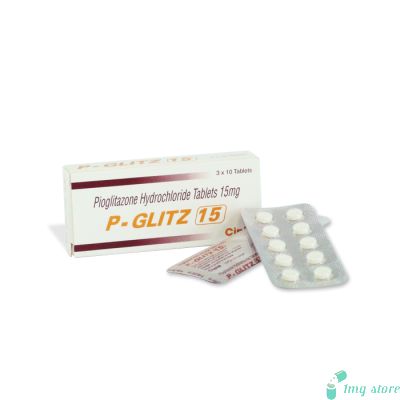Pioglit Tablet (Pioglitazone)
Buy Pioglitazone, often marketed under the brand names Actos and Pioglit, is a medication primarily prescribed for the management of type 2 diabetes mellitus.
Introduction of Pioglit Tablet (Pioglitazone)
Pioglitazone, often marketed under the brand name Actos, and Pioglit, is a medication primarily prescribed for the management of Type 2 Diabetes mellitus. It belongs to the thiazolidinedione class of drugs and works by improving insulin sensitivity in the body's cells. By enhancing the response of cells to insulin, Pioglitazone helps regulate blood sugar levels, reducing the risk of complications associated with Diabetes. This comprehensive guide provides essential information about Pioglitazone tablets, including dosage instructions, uses, potential side effects, precautions, and drug interactions. Pioglitazone tablet is a medication commonly prescribed for type 2 diabetes management. It belongs to the thiazolidinedione class, enhancing insulin sensitivity to regulate blood sugar levels.
Pioglitazone Dosage Information:
Standard Dosage: The typical starting dose of Pioglitazone is usually 15 to 30 milligrams (mg) taken orally once daily, with or without food. Your doctor may adjust the dosage based on your individual response and glycemic control needs.
Titration: The dosage may be gradually increased to a maximum of 45 mg per day if necessary, but this should be determined by your healthcare provider to minimize the risk of side effects.
Missed Dose: If you miss a dose, take it as soon as you remember. However, if it's close to the time for your next dose, skip the missed dose and resume your regular dosing schedule. Do not double the dose to catch up.
Overdose: In case of an overdose, seek immediate medical attention. Overdose symptoms may include severe hypoglycemia (low blood sugar) or other adverse reactions. It's crucial to adhere to the prescribed dosage to avoid such situations.
Duration: Pioglitazone is a long-term treatment that should be taken consistently as directed by your healthcare provider. Do not stop taking it without consulting your doctor, as abrupt discontinuation can lead to fluctuations in blood sugar levels.
Pioglitazone Uses:
Pioglitazone is used to treat type 2 diabetes by improving cellular response to insulin and aiding glucose utilization. It can be employed alone or with other drugs when diet and exercise aren't sufficient.
Pioglitazone and Diabetes:
Pioglitazone addresses insulin resistance, a key factor in type 2 diabetes, by making cells more responsive to insulin. This improves glycemic control and reduces the risk of complications associated with diabetes.
Pioglitazone Side Effects Long-Term:
Long-term use of Pioglitazone may pose certain risks. Studies suggest a potential association with bone fractures and a concern about bladder cancer. Regular monitoring and open communication with healthcare providers are essential to mitigate such risks.
Some of the precautionary measures to be taken while using Pioglit Tablet (Pioglitazone)
- Heart Health: Inform your doctor about any history of heart disease or heart failure, as Pioglitazone use has been linked to fluid retention, which could exacerbate heart conditions.
- Edema: Monitor for signs of fluid retention, such as rapid weight gain or swelling, and report them to your healthcare provider promptly.
- Bladder Issues: If you have a history of bladder cancer or bladder problems, discuss the potential risks and benefits of Pioglitazone with your doctor.
- Pregnancy and Breastfeeding: Pioglitazone/Actos is not recommended during pregnancy or breastfeeding due to potential risks to the fetus or infant. Consult your doctor for alternative treatment options.
- Bone Health: Individuals with a history of fractures or osteoporosis should discuss the potential impact of Pioglitazone on bone health with their healthcare provider.
Some of the specific indications for Actos/Pioglit Tablet (Pioglitazone) include
- Diabetes Management: Pioglitazone is primarily indicated for the management of type 2 diabetes mellitus. It helps lower blood sugar levels by increasing the sensitivity of cells to insulin, thereby enhancing glucose utilization.
- Combination Therapy: It can be prescribed as a monotherapy or in combination with other antidiabetic medications, such as metformin, sulfonylureas, or insulin when blood sugar levels are not adequately controlled with a single agent.
- Insulin Resistance: Pioglitazone addresses insulin resistance, a common issue in type 2 diabetes, by promoting effective utilization of insulin in muscle, fat, and liver cells.
- Cardiovascular Benefits: Research suggests that Pioglitazone might have cardiovascular benefits beyond glycemic control, such as reducing the risk of heart attacks and strokes in patients with diabetes and a history of cardiovascular disease.
- Polycystic Ovary Syndrome (PCOS): In some cases, Pioglitazone may be prescribed off-label to manage certain symptoms of PCOS, such as insulin resistance and irregular menstrual cycles.
Crucial Side Effects to Be Observed When Using Pioglit Tablet (Pioglitazone)
- Common Side Effects: Commonly reported side effects include weight gain, fluid retention, edema (swelling), headache, and muscle pain.
- Hypoglycemia: Pioglitazone itself is not known to cause hypoglycemia; however, when used in combination with other diabetes medications like insulin or sulfonylureas, the risk of low blood sugar increases.
- Bladder Cancer: There has been concern about a potential link between Pioglitazone use and an increased risk of bladder cancer. It's essential to discuss any unusual symptoms with your doctor, such as blood in urine or urinary urgency.
- Bone Fractures: Some studies have suggested a possible association between long-term Pioglitazone use and an increased risk of bone fractures, particularly in women. This risk should be weighed against the potential benefits of the medication.
- Liver Function: Regular monitoring of liver function is recommended, as Pioglitazone can, in rare cases, cause liver enzyme abnormalities. Your doctor will assess whether the benefits of the medication outweigh the potential risks.
Answers to Common Inquiries About Pioglitazone Tablet:
Q1. Can Pioglitazone be used alone for managing diabetes?
Answer: Yes, Pioglitazone can be used as monotherapy or in combination with other medications to manage type 2 diabetes effectively.
Q2. Are there any dietary considerations while taking Pioglitazone?
Answer: While no specific dietary restrictions are associated with Pioglitazone, maintaining a balanced diet and monitoring carbohydrate intake remain essential for managing blood sugar levels.
Q3. Does Pioglitazone increase the risk of heart problems?
Answer: Pioglitazone, like any medication, comes with potential risks. While it has shown cardiovascular benefits in some studies, patients with a history of heart issues should consult their doctor to assess the best treatment approach.
Q4. Can Pioglitazone be used during pregnancy?
Answer: Pioglitazone is generally not recommended during pregnancy due to potential risks. Pregnant women with diabetes should consult their healthcare provider for safe and appropriate treatment options.
Q5. Is there a connection between Pioglitazone and bone health?
Answer: Some studies suggest a possible link between long-term Pioglitazone use and an increased risk of fractures, particularly in women. Individuals with concerns about bone health should discuss this with their doctor before starting the medication.
Significant Drug Interactions that Require Attention For Pioglit Tablet (Pioglitazone)
- Insulin and Sulfonylureas: Combining Pioglitazone with insulin or sulfonylureas increases the risk of hypoglycemia. Close monitoring of blood sugar levels is necessary.
- Gemfibrozil: Concomitant use of Pioglitazone and gemfibrozil, a lipid lowering medication, can lead to an increased risk of severe hypoglycemia.
- CYP2C8 Inhibitors: Drugs that inhibit the CYP2C8 enzyme, such as some statins and antiarrhythmics, can increase Pioglitazone levels, potentially leading to adverse effects.
- Rifampin: Rifampin, an antibiotic, can reduce Pioglitazone levels in the blood, potentially reducing its effectiveness.
- Beta-Blockers: Some beta-blockers might mask the symptoms of hypoglycemia, making it more challenging to recognize low blood sugar levels.
| Manufacturer | : | Sun Pharma, India |
| Equivalent Brand | : | Actos |
| Generic Search | : | Pioglitazone |










